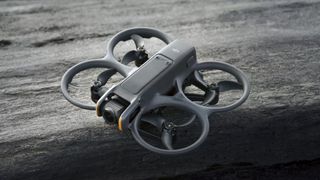DJI drones could be banned in the US soon – here's what you need to know
A recent bill banning DJI is moving through US Congress

Drone brand DJI could soon be banned from operating in the United States. According to a report from The New York Times (NYT), a bill called the Countering CCP Drones Act “passed unanimously by the House Energy and Commerce Committee” last month.
The legislation will move on to a floor vote in the House of Representatives within the next two months. If it passes there, it’ll continue onward to the Senate and potentially the President of the United State’s desk. DJI has now furiously condemned the potential ban, with a spokesperson calling it "a dangerous precedent for allowing baseless allegations and xenophohic fears".
There seem to be two main motivations behind this ban. One of the bill’s sponsors, Representative Elise Stefanik of New York, claims “DJI presents an unacceptable security risk” pointing to the company’s connection to the Chinese government. The NYT mentions how vulnerabilities were discovered back in 2020 that CCP officials could’ve utilized to access the personal information of American users. Although these vulnerabilities have since been patched, that hasn’t stopped the US Department of Defense from prohibiting its armed forces from buying the drones.
The other reason is an economic one. Representative John Moolenaar of Michigan said he wants to foster a “competitive… drone industry” in the United States. DJI drones, as you can imagine, are popular in the US making up “58 percent of the commercial market in 2022.” Kicking out the brand would, in theory, allow other brands to grow.
Cracking down
This isn’t the first time DJI has been caught in the crosshairs of the American government. Back in 2021, the company was placed on the Department of Commerce’s Entity List restricting access to key “US technologies”.
It's important to mention the Countering CCP Drones Act was introduced last spring. If you look through the bill’s summary, you’ll learn that it’ll place DJI drones under the purview of the Secure and Trusted Communication Networks Act. TheVerge in the coverage explains doing so will prevent the devices from accessing US networks, and place heavy limits on a drone's features.
You may be wondering why the bill is gaining traction now. Well, it may have something to do with TikTok. Scrutiny on Chinese tech has ramped up in recent months. President Joe Biden branded Chinese electric vehicles as a national security threat in March. Then the president signed a bill possibly banning TikTok. It forces parent company ByteDance to sell the platform within a year or get kicked out (or possibly get an extension). Perhaps seeing blood in the water, the DJI ban bill's sponsors are pushing it as another crackdown on China-based tech companies.
Get daily insight, inspiration and deals in your inbox
Sign up for breaking news, reviews, opinion, top tech deals, and more.
Counterarguments
DJI isn’t too happy about this. Early last month, they posted a facts sheet on their official Viewpoint blog criticizing and countering the arguments in the Countering CCP Drones Act. The company states they don’t help any government in espionage, support human rights abuses, or collect data without user consent. The NYT also revealed DJI is working behind the scenes with lobbyists to remain in the States.
Even if the company is banned, the technology powering its products may survive. Anzu Robotics is the new kid in the American drone industry and they launched the Raptor earlier this month which utilizes licensed DJI tech, the same kind found on the Mavic 3.
The difference is that Anzu is from Malaysia and they employ domestically made software in their device. With free range to operate, the Raptor could take the throne away from the Mavic 3 although this remains to be seen as it's pretty expensive. Prices for the Raptor start at $5,000; more than double of the Mavic.
If you want something more budget-friendly, check out TechRadar's list of the best drones for 2024.
You might also like

Cesar Cadenas has been writing about the tech industry for several years now specializing in consumer electronics, entertainment devices, Windows, and the gaming industry. But he’s also passionate about smartphones, GPUs, and cybersecurity.